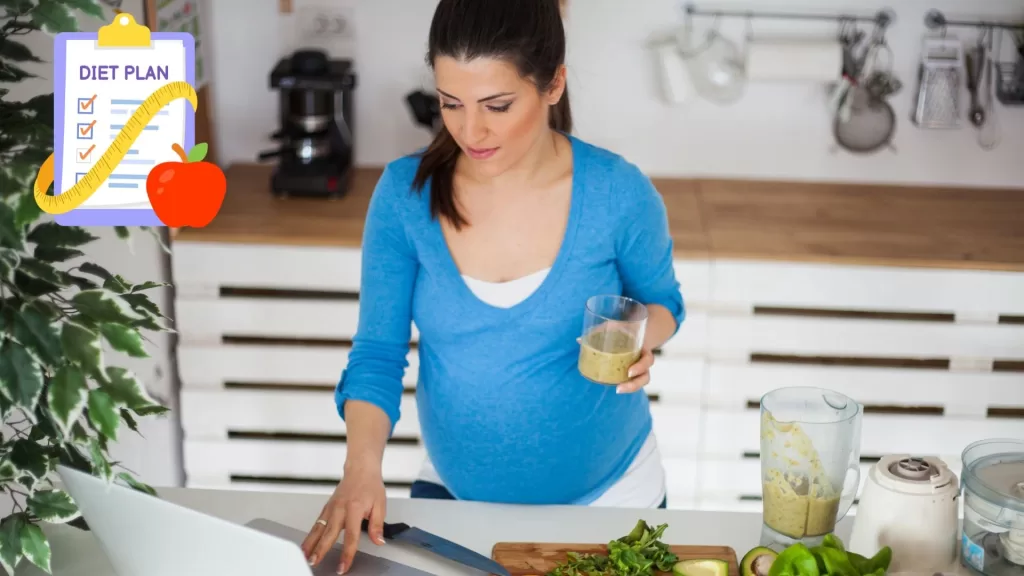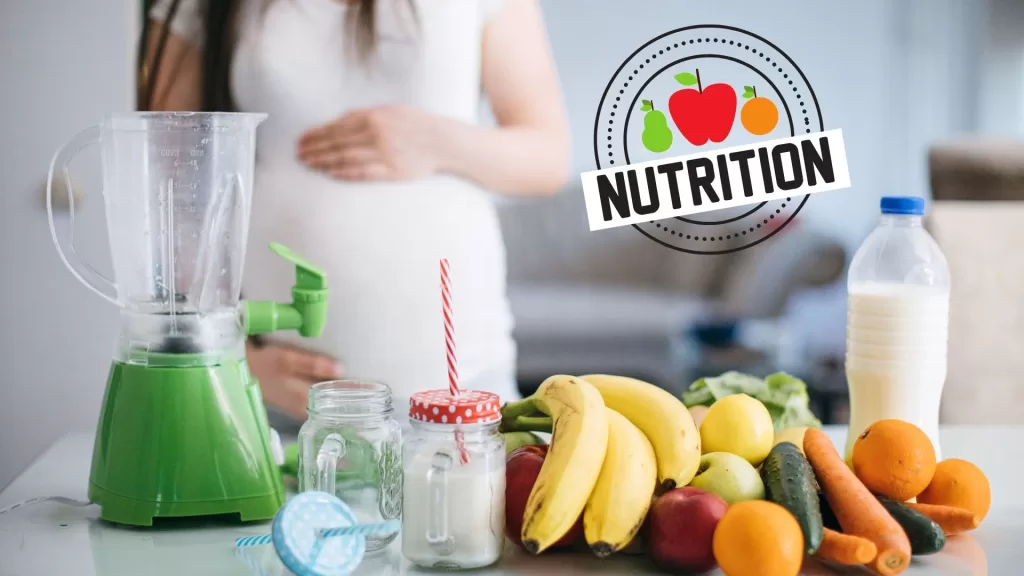The development of the infant depends much on a balanced and nutritious diet throughout pregnancy. The correct diet guarantees the mother’s health as well as promotes the brain, bones, and general condition of the infant. With the correct combination of proteins, vitamins, minerals, and fiber, a daily diet chart for pregnancy helps expecting women satisfy their dietary requirements. For a healthy pregnancy, it directs them on what, when, and how much to consume. Every day, eating foods high in nutrients helps every mother-to-be enjoy a better pregnancy, a safe birth, and a healthy baby.

Key Points: Daily Diet Chart for Pregnancy for a Healthy Baby
- The mother’s and the baby’s health depend on a balanced diet.
- Every day include fresh fruit, veggies, whole grains, proteins, and dairy.
- Get enough water—at least eight to ten glasses daily—to stay hydrated.
- Give iron, calcium, folic acid, and meals high in vitamins first priority.
- Avoid junk food, excessive coffee, and processed products.
- Small, frequent meals aid with digestion and energy levels.
- Consult a dietitian for a tailored pregnancy eating plan.
Introduction: Daily Diet Chart for Pregnancy
Pregnancy is a magnificent journey full of excitement, emotions, and new obligations. One of the most critical parts of a successful pregnancy is keeping a well-balanced and nutritious diet. What a woman eats strongly affects the growth and development of her kid. The appropriate diets supply important nutrients, maintain immunity, build the body, and enable the healthy development of the baby’s organs, bones, and brain.
A daily diet chart for pregnancy acts as a useful tool to organize your meals and maintain a balanced intake of all key nutrients. It ensures that you obtain adequate proteins, carbs, healthy fats, vitamins, and minerals essential for your changing body and developing baby. Including seasonal fruits, green leafy vegetables, dairy products, iron-rich meals, healthy grains, and nuts may make a tremendous impact on both maternal and fetal health.
Proper hydration, quantity management, and meal times are equally crucial to prevent pain, stomach difficulties, and energy slumps. A pregnant diet is not simply about eating more but also eating wisely and healthily. It also helps avoid issues, including gestational diabetes, anemia, and excessive weight gain.
Every woman’s nutritional requirements throughout pregnancy differ depending on her health condition, trimester, and body type. Consulting a doctor or dietitian is strongly suggested to modify your food plan. In this post, we will examine a simple and practical daily food plan for pregnancy that improves the health of both the mother and baby, ensuring a smooth and healthy pregnancy journey.
Importance of a Healthy Diet During Pregnancy
A nutritious diet during pregnancy plays a critical role in preserving the well-being of both the mother and the growing baby. The food a pregnant woman eats becomes the principal source of nutrients for her baby’s growth and development. A balanced and nutrient-rich diet helps promote the baby’s cognitive development, bone strength, immune system, and general health.

Proper diet also helps the woman maintain her energy levels, minimize pregnancy-related problems including anemia, gestational diabetes, and high blood pressure, and promote healthy weight growth. A balanced diet enhances the mother’s immune system, improves digestion, and lowers difficulties like morning sickness, constipation, and exhaustion.
Essential nutrients, including folic acid, iron, calcium, protein, omega-3 fatty acids, and fiber, are needed during pregnancy. They help in avoiding birth abnormalities, promote placenta growth, and guarantee the proper construction of the baby’s organs.
Additionally, a balanced diet enhances mental well-being by regulating mood fluctuations and minimizing stress. It helps the woman recover quicker after delivery and offers the energy required for nursing and caring for the infant.
In summary, a nutritious diet during pregnancy provides a foundation for a healthy mother, a healthy baby, and a pleasant pregnancy journey. Eating attentively and concentrating on fresh, healthful meals guarantees long-term advantages for both mother and child.
Diet Plan for a Healthy Pregnancy
A well-balanced diet during pregnancy ensures the woman obtains critical nutrients to support her health and the baby’s development.
Here’s an example daily eating plan for a healthy pregnancy:
Morning (After Waking Up)
After waking up in the morning time you should follow:
- Warm water with lemon or soaked almonds (4-5)
- A glass of milk or coconut water
Breakfast
When you start breakfast, you should need to eat.
- Whole grain bread, oats, or vegetable poha/upma
- Fresh fruits (apple, banana, or berries)
- A glass of milk or fresh fruit juice
Mid-Morning Snack
- Fresh fruits or vegetable salad
- Yogurt or a handful of nuts and seeds
Lunch
At lunchtime, Pregnant individuals need to eat the following foods.
- 1-2 Whole wheat chapatis or brown rice
- Dal or legumes (rich in protein)
- Fresh seasonal vegetables
- Curd or buttermilk
- Green leafy salad
Evening Snack
- Roasted makhana (fox nuts) or sprouts salad
- Herbal tea or fresh fruit smoothie
Dinner
Pregnant individuals need to include the following foods in their dinner.
- Chapati or rice
- Light dal or soup
- Steamed or sautéed vegetables
- Paneer or tofu for protein
Before Bed
You should eat the following before going to bed.
- A glass of warm milk with turmeric or a light snack like fruits
Tips:
Read here the general tips for a daily diet chart for pregnancy for a healthy baby.
- Stay hydrated throughout the day.
- Include iron, calcium, folic acid, and protein-rich foods.
- Avoid junk, oily, spicy, or processed foods.
- Eat small meals at regular intervals to avoid acidity or nausea.
This eating plan promotes the proper growth of the baby while ensuring the mother stays energized and fed during her pregnancy.
Essential Nutrients to Include in Your Pregnancy Diet
Here is a table format for the Essential Nutrients to include in Your Pregnancy Diet. Read carefully for your better knowledge and information.
| Nutrient | Importance | Food Sources |
|---|---|---|
| Folic Acid (Folate) | Prevents neural tube defects, supports fetal brain development | Green leafy vegetables, citrus fruits, lentils, fortified cereals |
| Iron | Supports increased blood volume, prevents anemia | Spinach, beetroot, lean meats, legumes, dry fruits |
| Calcium | Builds strong bones and teeth for the baby | Milk, cheese, yogurt, tofu, almonds, broccoli |
| Protein | Essential for fetal tissue growth and muscle development | Eggs, dairy products, legumes, nuts, lean meats |
| Omega-3 Fatty Acids | Supports brain and eye development of the baby | Fish (low mercury), flaxseeds, walnuts, chia seeds |
| Vitamin D | Helps absorb calcium, strengthens bones | Fortified milk, sunlight exposure, fish |
| Fiber | Prevents constipation, aids digestion | Whole grains, fruits, vegetables, legumes |
| Zinc | Supports cell growth and immune function | Pumpkin seeds, nuts, whole grains, dairy |
| Vitamin C | Boosts immunity, improves iron absorption | Citrus fruits, strawberries, bell peppers |
| Iodine | Supports thyroid function and fetal brain development | Iodized salt, dairy products, seafood |
| Magnesium | Reduces cramps, supports muscle function | Bananas, nuts, seeds, green leafy vegetables |
This infographic gives a short overview of the most necessary nutrients and their sources for a healthy pregnancy diet.
Nutritious Foods to Include for a Healthy Pregnancy
A balanced and nutritious diet is essential during pregnancy to support the health of both the mother and the growing baby. Here are some of the best foods to include in your daily pregnancy diet:

1. Fruits and Vegetables
Rich in vitamins, minerals, antioxidants, and fiber. They aid digestion, prevent constipation, and boost immunity. Include seasonal fruits, berries, leafy greens, carrots, and broccoli.
2. Whole Grains
Provide energy, fiber, and essential nutrients like iron and B-vitamins. Include brown rice, oats, whole wheat bread, and quinoa.
3. Dairy Products
Excellent source of calcium, protein, and vitamin D for strong bones and teeth development. Include milk, yogurt, cheese, and paneer.
4. Protein-Rich Foods
Vital for baby’s tissue growth. Include eggs, lean meats, poultry, legumes, lentils, beans, tofu, and nuts.
5. Iron-Rich Foods
Prevent anemia and support increased blood volume. Include spinach, beetroot, dates, dry fruits, and fortified cereals.
6. Healthy Fats
Support brain and eye development. Include avocados, nuts, seeds, and omega-3-rich fish like salmon (low mercury).
7. Hydrating Foods
Maintain fluid balance and prevent dehydration. Drink plenty of water, coconut water, and fresh fruit juices.
8. Iodine & Zinc-Rich Foods
Support thyroid health and immune function. Include iodized salt, dairy, seafood, pumpkin seeds, and legumes.
Including these nutrient-dense foods in your pregnancy diet will promote the healthy development of your baby and maintain your overall well-being.
What is a Good Diet Plan for Pregnancy?
Daily diet chart for pregnancy: A proper pregnancy diet emphasizes balanced nutrition, thereby supplying the necessary elements to maintain the health of the mother and child. The diet should include proteins, healthy fats, vitamins, minerals, and sufficient water throughout the day.
Sample Daily Diet Plan for Pregnancy:
| Meal Time | Recommended Foods |
|---|---|
| Early Morning | Warm water with lemon, soaked almonds, or walnuts |
| Breakfast | Whole-grain toast, milk, oats/porridge, fruits, boiled eggs |
| Mid-Morning Snack | Fresh fruit like apple, banana, or citrus fruits; coconut water |
| Lunch | Brown rice/roti, dal (lentils), green vegetables, curd, salad |
| Afternoon Snack | Fresh juice, buttermilk, roasted nuts, sprouts |
| Evening Snack | Herbal tea with whole-grain biscuits, fresh fruits |
| Dinner | Vegetable soup, chapati, light curry, paneer/tofu, mixed salad |
| Bedtime Drink | Warm milk with a pinch of turmeric |
Key Guidelines:
- Eat little, often to avoid acidity and nausea.
- Add foods high in iron—spinach, beetroot, and dates.
- Eat daily dairy goods high in calcium.
- Keep hydrated with fruit juices, coconut water, and water.
- Cut deep-fried, processed, sugary meals.
- Steer clear of heavy-mercury seafood and raw or undercooked meat.
A well-balanced pregnancy diet guarantees the mother’s strength and immunity all during pregnancy, aids in good fetal growth, and avoids problems.
What Makes a Baby Beautiful in the Womb?
A baby’s attractiveness in the womb is impacted by a mix of genetics, diet, and the mother’s general health and well-being throughout pregnancy. While physical attributes like skin tone, facial features, and hair texture are generally inherited from the parents, a healthy lifestyle during pregnancy may considerably boost the baby’s growth, skin health, and overall development.
Key Factors That Contribute to a Beautiful Baby in the Womb:
| Factors | How It Helps |
|---|---|
| Balanced Nutrition | Provides essential vitamins & minerals for healthy skin, hair, and growth. |
| Hydration | Keeps the baby’s skin soft and supple. |
| Folic Acid & Iron | Supports good blood circulation, promoting healthy development. |
| Vitamin C & E | Enhances skin glow and boosts immunity. |
| Healthy Lifestyle | Reduces stress hormones, creating a positive environment for the baby. |
| Genetics | Inherited features from both parents influence appearance. |
| Avoiding Harmful Habits | Staying away from smoking, alcohol, and junk food preserves baby’s health. |
Natural Tips to Support Baby’s Beauty in the Womb:
- Consume fruits such as oranges, pomegranates, and apples.
- Incorporate saffron milk, walnuts, and almonds sparingly.
- For optimism, try yoga or meditation throughout pregnancy.
- Remain joyful and stress-free for your emotional health.
- Get adequate rest and sleep.
Recall that pleasure and health are the sources of genuine beauty. A newborn that has received proper nutrition, love, and care is always lovely on the inside as well as the outside.
Foods and Beverages to Avoid During Pregnancy
Both the mother’s and the growing baby’s health throughout pregnancy depend on maintaining a safe and nutritious diet. Bacteria, poisons, or other dangerous things may make certain meals and drinks unhealthy. By avoiding them, problems like infections, allergies, or developmental problems may be avoided.
List of Foods and Beverages to Avoid:
| Food/Beverage | Reason to Avoid |
|---|---|
| Raw or Undercooked Meat | Risk of bacterial infections (Listeria, Salmonella). |
| Unpasteurized Dairy Products | May contain harmful bacteria causing foodborne illness. |
| Raw Seafood & Sushi | High risk of parasites and bacteria. |
| High-Mercury Fish (Shark, Swordfish, King Mackerel) | Mercury can harm the baby’s brain development. |
| Raw Eggs or Foods Containing Them | Risk of Salmonella infection. |
| Caffeine in Excess | High amounts can increase risk of miscarriage or low birth weight. |
| Alcohol | May cause fetal alcohol syndrome or birth defects. |
| Unwashed Fruits & Vegetables | Possible exposure to pesticides or bacteria. |
| Processed & Junk Foods | Low nutrition, high in unhealthy fats, sugar, and salt. |
| Artificial Sweeteners (Some Types) | Certain types may not be safe during pregnancy. |
Quick Tips for a Safe Pregnancy Diet:
- Fruits and vegetables should always be well cleaned.
- Consume meat and fish that are cooked through.
- Choose dairy products and pasteurized milk.
- Don’t consume more than one cup of coffee each day.
- Drink plenty of water, fresh juices, and nutritious beverages to stay hydrated.
Final Note:
For a customized meal plan that will guarantee safety and nourishment throughout pregnancy, speak with your physician or dietitian.
Also Read: What are the Health Benefits of Watermelon?
How to Enjoy Pregnancy: Simple Tips for a Happy Journey
Pregnancy is a beautiful phase of life, filled with excitement and new experiences. However, it can also bring emotional and physical challenges. The key is to embrace this special time with positivity, self-care, and joyful moments.

Tips to Enjoy Pregnancy Fully:
To enjoy pregnancy, emphasize your well-being with a healthy lifestyle, including a balanced diet, regular exercise, adequate rest, and stress management strategies like meditation or prenatal yoga, while also seeking support from loved ones and participating in activities you like.
1. Prioritize Self-Care
Take time to rest, relax, and pamper yourself. Gentle massages, skincare, and prenatal yoga can make you feel refreshed.
2. Eat Healthy & Satisfy Cravings
Enjoy a balanced diet but allow yourself to indulge in pregnancy-safe treats occasionally.
3. Stay Active
Mild exercises like walking, swimming, or prenatal yoga boost energy, reduce stress, and prepare your body for labor.
4. Connect with Your Baby
Talk, sing, or play soft music to your baby. It strengthens your emotional bond and creates a joyful connection.
5. Create Memories
Capture special moments through pictures, journaling, or making a baby scrapbook.
6. Surround Yourself with Positivity
Spend time with supportive family and friends. Avoid stress and negative conversations.
7. Learn & Prepare
Read about pregnancy, childbirth, and parenting. Join online pregnancy communities for support and ideas.
8. Treat Yourself
Go for prenatal spa sessions, shop for cute maternity wear, or plan a relaxing babymoon.
9. Practice Mindfulness
Meditation, deep breathing, and gratitude exercises help in managing mood swings and anxiety.
Final Thought:
Pregnancy is a beautiful journey – listen to your body, treasure every tiny moment, and concentrate on your mental and physical well-being. Happiness inside reflects in a healthy pregnancy and a wonderful parenthood ahead!
Video Review: Daily Diet Chart for Pregnancy for a Healthy Baby
Public Reviews for Daily Diet Chart for Pregnancy
“This daily eating schedule helped me keep on track throughout my pregnancy. It was simple to follow and provided a wonderful mix of nourishment. I felt energized and healthy throughout my pregnancy!”
— Riya Sharma, New Delhi
“As a first-time parent, I was confused about what to consume. This diet plan led me pretty nicely. My kid was delivered healthily, and my doctor also liked my balanced diet.”
— Anjali Mehta, Mumbai
“This diet plan was a gift for me throughout my pregnancy in the USA. It focused on natural, healthful meals that benefited both my health and my baby’s growth. I appreciated the diversity it gave!”
— Emma Johnson, California, USA
“As a Canadian mom-to-be, I loved how the plan incorporated local cuisine alternatives and focused on hydration. It kept me busy and stress-free throughout my pregnant journey.”
— Olivia Martin, Toronto, Canada
“This was one of the greatest pregnant diet instructions I came found in the UK. It was practical, thorough, and simple to follow with local cuisine options. My pregnancy was healthy and easy.”
— Amelia Brown, London, UK
“I followed your diet program in Australia and found it beneficial. It kept me energetic, and my baby’s development was perfectly on pace throughout every check-up.”
— Sophie Wilson, Sydney, Australia
“The food ideas and nutritional instructions in this chart were just what I needed throughout my pregnancy in Dubai. It concentrated on fresh fruits, proteins, and balanced nutrition.”
— Fatima Al Noor, Dubai, UAE
“Being a working parent in Singapore, this diet plan helped me maintain a healthy habit with simple and quick food choices. I strongly suggest it to any pregnant mother.”
— Rachel Lim, Singapore
“This daily diet plan was a fantastic guidance for me in South Africa. It offered nutritious dishes that I could readily adapt to local sources while guaranteeing sufficient nutrition.”
— Thandiwe Mokoena, Johannesburg, South Africa
Conclusion
Daily diet chart for pregnancy: A balanced and healthy daily diet plan during pregnancy plays a significant part in supporting the health and well-being of both the mother and the developing baby. During pregnancy, the body needs additional attention, critical nutrition, and good lifestyle practices to promote the baby’s growth and preserve the mother’s energy levels. A well-planned diet rich in proteins, vitamins, minerals, calcium, iron, fiber, and hydration may significantly benefit the baby’s growth, brain development, immunity, and general health.
Avoiding unhealthy meals, processed goods, excessive coffee, and sugary beverages is equally crucial. Along with a correct diet, frequent physical exercise, stress management, and enough rest contribute to a successful pregnancy journey.
Remember, every pregnancy is unique; therefore, contacting a healthcare expert or nutritionist before following any exact diet plan is strongly suggested. Personalized coaching guarantees that the nutritional requirements of both mother and baby are adequately satisfied.
A smart pregnancy diet not only feeds the baby in the womb but also prepares the mother for safe delivery and postpartum recovery. A good diet now lays the groundwork for a healthy future for both mother and child. After all, adequate nutrition throughout pregnancy is the first step in welcoming a healthy and happy baby into the world.
FAQs – Daily Diet & Habits During Pregnancy
Read here the most important frequently asked questions for the Daily Diet Chart for Pregnancy and some habits during pregnancy time.
1. What to drink during pregnancy?
During pregnancy, keeping hydrated is vital. Pregnant people should consume lots of water, fresh fruit juices (without added sugar), coconut water, milk, herbal teas (doctor-approved), and smoothies. These aid in digestion, nutrition absorption, and keeping energy levels balanced.
2. Can the baby feel when I rub my belly?
Yes, around the second trimester (about 20 weeks), newborns may feel light touches or massages on the abdomen. It gives comfort and increases the connection between the mother and baby. The baby may react with little movements or kicks.
3. What to eat so the baby has hair?
For good hair development in newborns, incorporate meals high in Vitamin E, Omega-3 fatty acids, Biotin, Protein, and Iron. Foods like almonds, walnuts, salmon (low mercury), eggs, spinach, and sweet potatoes are helpful for a baby’s hair growth.
4. What habits can cause a miscarriage?
Habits that may raise the chance of miscarriage include smoking, alcohol drinking, drug addiction, excessive coffee intake, stress, poor diet, exposure to dangerous chemicals, and not following medical advice. Always seek a doctor for lifestyle advice throughout pregnancy.
5. How to sleep during pregnancy?
Sleeping on the left side is typically suggested during pregnancy since it increases blood flow to the baby and lowers strain on internal organs. Use pregnancy pillows for support, keep a peaceful sleep environment, and avoid resting on your back after the first trimester.
Authors’ Remarks:
Hello! I am Dr. SankhaSubhra Basu, MBBS, MD (CERT), a healthcare expert and consultant, certified in Intensive Care Medicine & Diabetology – NHS UK professionals, fitness, nutritionists, and wellness experts. With a passion for promoting wellness, I provide accurate, practical insights. This article offers valuable information to support your health journey and empower better lifestyle choices. 📍 Visit Dr. Basu’s Profile
You can visit our site daily to get the latest information about health, fitness, your daily recipes, Nutrition facts, healthcare, and wellness Insights. For more information, please visit our website, The 9nn Times.
Disclaimer
The material presented in this article is for informative purposes only and should not be taken as legal advice. While attempts have been taken to ensure accuracy and reliability, no assurances are provided on the completeness or usefulness of the material. The author and publisher assume no responsibility for any actions made based on the information included in this article. Any links to external resources are given for convenience and do not require information sponsorship.